Iranian men, left, and women, right, queue for voting in the parliamentary and Experts Assembly elections in a polling station in Tehran, Iran, Friday, Feb. 26, 2016. Iranians across the Islamic Republic voted Friday in the country's first election since its landmark nuclear deal with world powers, deciding whether to further empower its moderate president or side with hard-liners long suspicious of the West. The election for Iran's parliament and a clerical body known as the Assembly of Experts hinges on both the policies of President Hassan Rouhani, as well as Iranians worries about the country's economy, long battered by international sanctions. (AP Photo/Vahid Salemi)
The Associated Press
TEHRAN, Iran (AP) - Reformists and moderate conservatives were leading in parliamentary elections according to early results Saturday, an indication President Hassan Rouhani may face a more friendly house to pursue his domestic agenda.
Early returns from Friday's polls show that none of the three competing political factions will win a majority in the 290-seat parliament. But reformists seeking greater democratic changes are heading toward their strongest presence since 2004 at the expense of hard-liners.
Officials are yet to release early results but reports in the semiofficial Fars and Mehr news agencies and a count conducted by The Associated Press show that hard-liners are the main losers of the vote.
Friday's election for Iran's parliament and a powerful clerical body known as the Assembly of Experts was the first since Iran's landmark nuclear deal with world powers last year.
Reformists seeking greater democratic changes and moderates supporting Rouhani appear to be cashing in on the lifting of international sanctions the moderate president achieved under last summer's historic agreement.
Nearly 55 million of Iran's 80 million people were eligible to vote. Participation figures and other statistics were not immediately available, though Interior Minister Abdolreza Rahmani Fazli predicted late Thursday there would be a turnout of 70 percent.
Polls were closed at midnight and officials immediately began counting the ballots afterward. As more ballots are counted, reformists appear to be on the path to expand their presence from the fewer than 20 they currently hold to a majority with the moderate conservatives and reduce the number of hard-liners.
Partial results emerging from about 50 small towns across Iran, show reformists and their moderate allies were leading the vote with moderate conservatives and hard-liners trailing behind them. In the capital Tehran, officials counting the ballots at three different districts confirmed to The Associated Press that reformists were leading far ahead of their hard-line rivals.
The hard line camp is largely made up of loyalists of Rouhani's predecessor, Mahmoud Ahmadinejad, who during his two terms in office avidly stoked tensions with the U.S. and cracked down on internal dissidents.
In a bid to squeeze them out, reformists have allied with moderate conservatives, many of whom split with the hard liners because of Ahmadinejad.
Reformists stormed to power with the 1997 election of President Mohammad Khatami, followed by 2000 parliamentary elections that brought a reformist majority in parliament for the first time. The movement pressed for an easing of Islamic social restrictions, greater public voice in politics and freedom of expression and better ties to the international community.
But that hold was broken in the next election in 2004, when reformist candidates were largely barred from running. Ahmadinejad's election victory in 2005 sealed the movement's downfall. Reformists were all but shut out of politics for nearly a decade until Rouhani was elected.
In this photo released by official website of the office of the Iranian Presidency, President Hassan Rouhani casts his ballot for parliamentary elections in Tehran, Iran, Friday, Feb. 26, 2016. Iranians were voting on Friday in parliamentary elections, the country's first since its landmark nuclear deal with world powers last summer. At the same time as parliamentary elections, Iranians are also voting for the Assembly of Experts, a clerical body empowered to choose or dismiss the country's supreme leader. (Iranian Presidency Office via AP)
The Associated Press
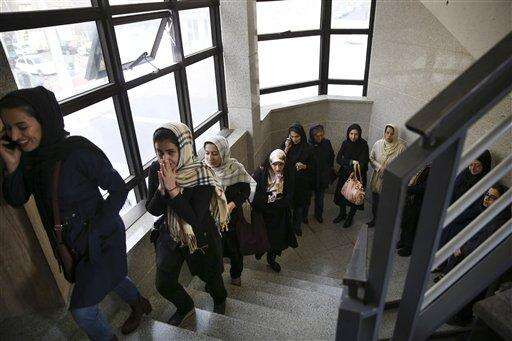
Iranians queue for voting in the parliamentary and Experts Assembly elections in a polling station in central Tehran, Iran, Friday, Feb. 26, 2016. Iranians were voting on Friday in parliamentary elections, the country's first since its landmark nuclear deal with world powers last summer. At the same time as parliamentary elections, Iranians are also voting for the Assembly of Experts, a clerical body empowered to choose or dismiss the country's supreme leader. (AP Photo/Vahid Salemi)
The Associated Press
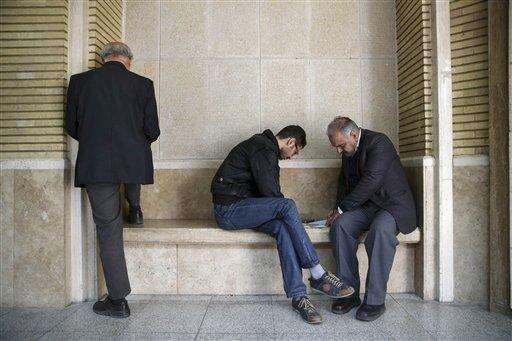
Iranian voters fill out their ballots during the parliamentary and Experts Assembly elections in a polling station in central Tehran, Iran, Friday, Feb. 26, 2016. Iranians were voting on Friday in parliamentary elections, the country's first since its landmark nuclear deal with world powers last summer. At the same time as parliamentary elections, Iranians are also voting for the Assembly of Experts, a clerical body empowered to choose or dismiss the country's supreme leader. (AP Photo/Vahid Salemi)
The Associated Press
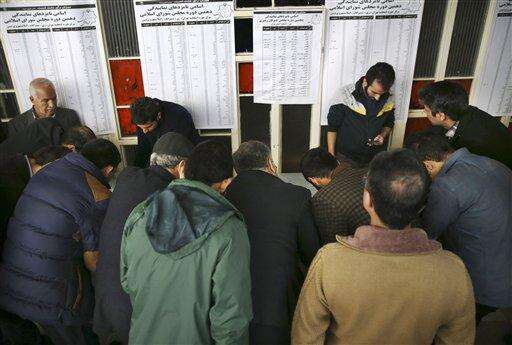
Iranian voters fill out their ballots during the parliamentary and Experts Assembly elections in a polling station in central Tehran, Iran, Friday, Feb. 26, 2016. Iranians were voting on Friday in parliamentary elections, the country's first since its landmark nuclear deal with world powers last summer. At the same time as parliamentary elections, Iranians are also voting for the Assembly of Experts, a clerical body empowered to choose or dismiss the country's supreme leader. (AP Photo/Vahid Salemi)
The Associated Press
Iran's Parliament speaker Ali Larijani casts his ballot during parliamentary and Experts Assembly elections at a polling station in Qom, 125 kilometers (78 miles) south of the capital Tehran, Iran, Friday, Feb. 26, 2016. Iranians were voting on Friday in parliamentary elections, the country's first since its landmark nuclear deal with world powers last summer. (AP Photo/Ebrahim Noroozi)
The Associated Press
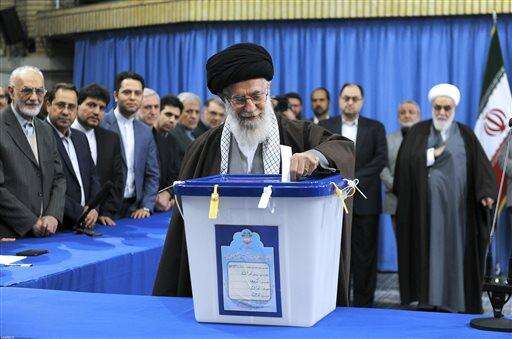
In this photo released by official website of the office of the Iranian supreme leader, Supreme Leader Ayatollah Ali Khamenei casts his ballot during parliamentary and Experts Assembly elections in Tehran, Iran Friday, Feb. 26, 2016. Iranians were voting on Friday in parliamentary elections, the country's first since its landmark nuclear deal with world powers last summer. At the same time as parliamentary elections, Iranians are also voting for the Assembly of Experts, a clerical body empowered to choose or dismiss the country's supreme leader. (Office of the Iranian Supreme Leader via AP)
The Associated Press
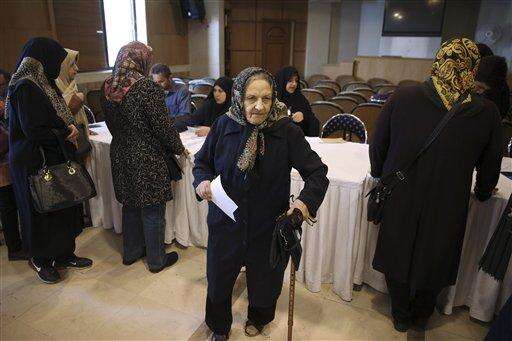
An Iranian elderly woman makes her way after receiving ballot papers to vote for the parliamentary and Experts Assembly elections in a polling station in central Tehran, Iran, Friday, Feb. 26, 2016. Iranians were voting on Friday in parliamentary elections, the country's first since its landmark nuclear deal with world powers last summer. At the same time as parliamentary elections, Iranians are also voting for the Assembly of Experts, a clerical body empowered to choose or dismiss the country's supreme leader. (AP Photo/Vahid Salemi)
The Associated Press
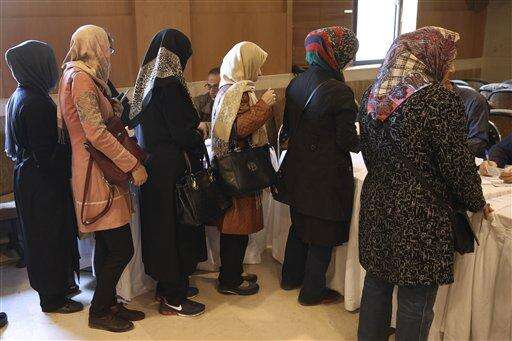
Iranian voters queue for getting ballot papers during the parliamentary and Experts Assembly elections in a polling station in central Tehran, Iran, Friday, Feb. 26, 2016. Iranians were voting on Friday in parliamentary elections, the country's first since its landmark nuclear deal with world powers last summer. At the same time as parliamentary elections, Iranians are also voting for the Assembly of Experts, a clerical body empowered to choose or dismiss the country's supreme leader. (AP Photo/Vahid Salemi)
The Associated Press
Iranians vote in the parliamentary and Experts Assembly elections at a polling station in Qom, 125 kilometers (78 miles) south of the capital Tehran, Iran, Friday, Feb. 26, 2016. Polls opened Friday in Iran's parliamentary elections, the country's first since its landmark nuclear deal with world powers last summer. (AP Photo/Ebrahim Noroozi)
The Associated Press
Iranians line up for voting in parliamentary and Experts Assembly elections outside a polling station in central Tehran, Iran, Friday, Feb. 26, 2016. Iranians were voting on Friday in parliamentary elections, the country's first since its landmark nuclear deal with world powers last summer. At the same time as parliamentary elections, Iranians are also voting for the Assembly of Experts, a clerical body empowered to choose or dismiss the country's supreme leader. (AP Photo/Vahid Salemi)
The Associated Press
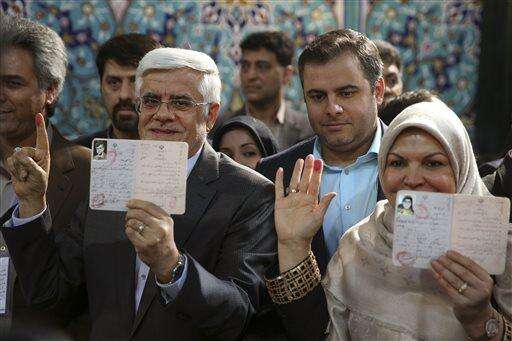
Head of the reformists' coalition list of the Iranian parliamentary elections in Tehran Mohammad Reza Aref, left, and his wife Hamideh Moravej Farshi show their identifications and inked fingers to media after casting their votes at a polling station in northern Tehran, Iran, Friday, Feb. 26, 2016. Iranians were voting on Friday in parliamentary elections, the country's first since its landmark nuclear deal with world powers last summer. At the same time as parliamentary elections, Iranians are also voting for the Assembly of Experts, a clerical body empowered to choose or dismiss the country's supreme leader. (AP Photo/Vahid Salemi)
The Associated Press
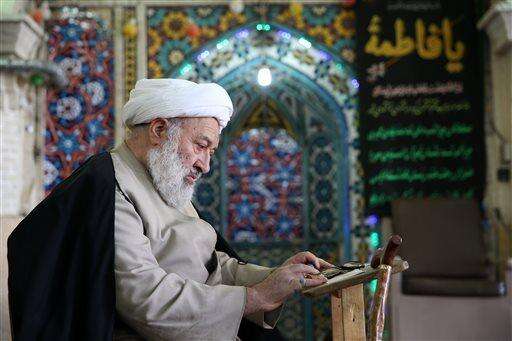
An Iranian votes in the parliamentary and Experts Assembly elections at a polling station in Qom, 125 kilometers (78 miles) south of the capital Tehran, Iran, Friday, Feb. 26, 2016. Iranians were voting on Friday in parliamentary elections, the country's first since its landmark nuclear deal with world powers last summer.(AP Photo/Ebrahim Noroozi)
The Associated Press